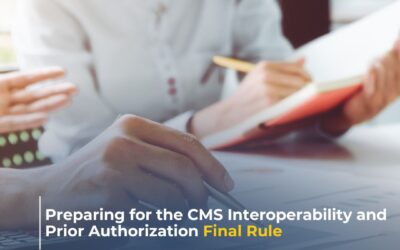Streamlining Prior Authorization: Insights on the Improving Seniors’ Timely Access to Care Act of 2024
The bipartisan momentum behind the Improving Seniors’ Timely Access to Care Act of 2024 marks a critical step forward in addressing a longstanding issue in healthcare: the inefficiencies of prior authorization. With broad support in both the House and Senate, this legislation aims to streamline and standardize prior authorization processes within Medicare Advantage, ensuring patients receive timely and necessary care.
Why Prior Authorization Reform is Essential
Prior authorization, originally designed to promote cost-effective and appropriate care, has evolved into a burdensome and opaque process that often delays treatment and creates unnecessary hurdles for patients and healthcare organizations. The statistics speak for themselves*:
- 94% of physicians report that prior authorization leads to care delays.
- 24% say these delays have caused serious adverse events, including hospitalization, disability, and, in extreme cases, death.
- 95% of physicians identify prior authorization as a significant contributor to burnout, consuming an average of 12 hours of administrative time per week.
These inefficiencies directly impact patient outcomes, leading to treatment abandonment and worsening health conditions, while undermining the trust patients place in their healthcare providers and payers.
Agadia’s Role in Revolutionizing Prior Authorization
At Agadia, we’ve long recognized the challenges posed by prior authorization and have developed cutting-edge solutions to address these pain points. Our technology is designed to streamline the prior authorization process for health plans, PBMs, hub service companies, specialty pharmacies, and drug manufacturers.
Agadia’s flagship product, PAHub, is trusted by more than 50 health plans and PBMs, supporting nearly 100 million lives. Our solutions are built to improve patient access to care, reduce operational inefficiencies, and create better outcomes.
What’s in the Bill?
The Improving Seniors’ Timely Access to Care Act of 2024 seeks to modernize and simplify how Medicare Advantage plans handle prior authorizations. Key provisions include:
Real-Time Decisions: The legislation requires the Office of National Coordinator for Health Information Technology and the Centers for Medicare & Medicaid Services (CMS) to define “real-time decisions” for routinely approved services. CMS is empowered to enforce this process, ensuring that emergent cases are resolved within 24 hours.
- How Agadia Helps: Agadia’s solutions enable automated decision-making capabilities, including real-time approvals for routine cases. Our tools reduce manual intervention, ensuring faster response times for critical and routine requests.
Uniform Electronic Standards: The bill mandates the adoption of uniform electronic prior authorization standards, eliminating the use of faxes and proprietary payer portals.
- How Agadia Helps: Agadia played a pivotal role in writing the NCPDP ePA standards, ensuring seamless integration and communication across systems. Our expertise in electronic prior authorization aligns perfectly with the bill’s push for modernization.
Transparency Requirements: Health plans will be required to disclose policies, evidence, and statistics related to prior authorization, including a list of services subject to prior authorization and data on denials and overturned appeals.
- How Agadia Helps: Our robust reporting tools provide detailed insights into prior authorization workflows, including denial and appeal rates. These capabilities empower organizations to meet transparency requirements effortlessly while identifying areas for improvement.
Gold-Carding Programs: Insurers are encouraged to create gold-carding programs, which reduce administrative hurdles for providers with strong performance histories.
- How Agadia Helps: Agadia’s customizable workflows support the implementation of gold-carding programs. While currently tailored to specific client needs, we are on track to offer global gold-carding capabilities by 2025.
By addressing these issues, the bill emphasizes speed, transparency, and fairness in prior authorization, benefiting patients and reducing administrative strain on payers.
The Human Impact
The current prior authorization system causes delays that can have severe consequences for patients, including adverse health outcomes and unnecessary stress. Even for healthcare organizations, the process often feels like a maze of inefficiencies and unclear criteria. By simplifying and standardizing prior authorization, the proposed reforms can improve patient access to timely care and reduce the administrative burden on health plans and PBMs.
A Call to Action
The bipartisan support for the Improving Seniors’ Timely Access to Care Act reflects a shared understanding of the need for reform. By simplifying and modernizing prior authorization, this legislation offers an opportunity to enhance care delivery for millions of Americans.
At Agadia, we are proud to contribute to these efforts by providing solutions that empower healthcare organizations to navigate these challenges effectively. Together, we can prioritize patient care, reduce administrative burdens, and deliver better outcomes for all.
If you’re ready to explore how Agadia’s prior authorization solutions can help your organization, let’s connect. The time for change is now, and we’re here to help lead the way.
Resources:
*The Issue | Fix Prior Auth










